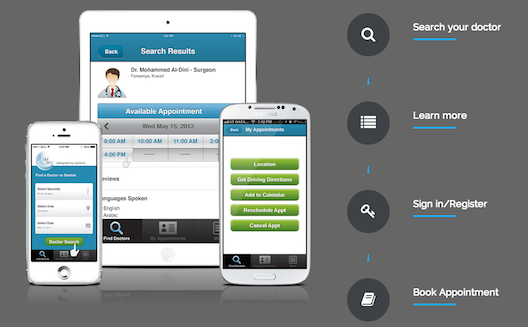Smart phones in healthcare: Lessons drawn from the experience of Kuwaiti AbiDoc


With technology infiltrating pretty much every aspect of life, the intertwining of disciplines is the norm, in particular, in the health sector. While governments in the region carry out their expansionary policies in spending on healthcare infrastructure, the ‘mobile health’ domain (the use of mobile phones technology in the health sector) is expecting some of its own new investments and innovations.
Through a simple algorithm, Kuwaiti physician Mussaad Al-Razouki estimates the size of the healthcare sector in the MENA region at $50 to $60 billion USD, where e-healthcare accounts for only 1% of this amount (that’s $500 to $600 million USD) - numbers that can be translated into great opportunities for entrepreneurs in the field.
However, despite the efforts of some governments in the region, to finance small projects, new initiatives will not materialize without capital investment. That is why, according to Al-Razouki, the private sector contribution remains a pressing requisite to ensure and enhance the presence of these companies.
The move from practicing medicine to creating apps might seem like a gear shift, but for Al-Razuki it’s been on the cards for a while. After practicing oral and maxillofacial surgery in the United States, the surgeon headed to Columbia Business School to get his MBA, becoming the first Arab doctor to obtain an MBA with a specialization in healthcare management. Following an experience in business consultancy, he dedicated himself full time to launching companies that deal with health and e-commerce.
Despite Al-Razouki’s interest in e-commerce and the commitment to his projects in the field, healthcare remains his original passion. It is worth noting here the role social entrepreneurship has played in developing this sector and keeping it up-to-date. Just as medicine witnesses breakthroughs and the emergence of developments, the next stage will bring forward new disciplines, most notably biotechnology and biostatistics, in addition to mobile health.
One of several projects, Abidoc is one of Al-Razouki’s most important, having won him the Most Innovative Mobile Application title at the 4th Annual MENA LTE Conference earlier this year. A website and an app, Abidoc enables users in Kuwait to directly book an appointment with a group of doctors, according to their need, with the option of searching doctors by specialty, region, method of payment, reason for the visit, language, and gender. The seven-member team works on providing and operating a network that so far has more than 1,000 doctors in Kuwait alone. According to Al-Razouki they are booking 10 to 15 appointments a day.
The project launched in 2013, with seed financing amounting to $300,000 USD. Abidoc’s cofounders also contributed to the launch. Abidoc also recently managed to collect $1.7 million USD in a Series A investment round from Saudi investors, while their next stage will allocate a part of this amount to launch and expand the service in Saudi Arabia. Al-Razouki expects for the company to reimburse the investment within 18 to 24 months.

Al-Razouki is also developing other opportunities in the healthcare sector through his companies in the medical tourism field, Kleos Healthcare and MedTrip. He is also the cofounder of Glambox, an online beauty product retailer which, in 2013, obtained a $1.36 billion USD investment from STC, MBC Ventures, and R&R Fund, in order to aid expansion in Saudi Arabia.
So, what advice does Dr. Al-Razouki have for entrepreneurs in the region?
1) Seek mentorship and coaching, not necessarily from mentors in the field of your project. Their advice and points of view will expand your vision and direction.
2) Share your idea with others and don’t be afraid of criticism or theft. If you are unable to defend your idea, it means it does not deserve to be developed. And if the idea is vulnerable to theft, it means that you did not protect it properly.
3) Choose the right team and make sure that all its members commit to the project for a specified time. Many entrepreneurs start a project and then get distracted by another project or job, weakening and hindering the team.
4) Don’t be afraid of failure. Wear your failure on your shoulder like a medal of honor. This failure taught you lessons from the previous period and provided you with effective tools to use in the next stage.
5) Entrepreneurship is built on two main pillars: funds and market. Hence, all projects, especially those in the field of social entrepreneurship, must be financially feasible and sustainable.
6) Target Saudi Arabia. If you are seeking to ensure a sustainable expansion for your business, you should develop a business strategy for Saudi Arabia, it’s the market that provides the greatest opportunities for growth in the region.
7) Practice remains the best educational opportunity. Instead of relying on certain educational programs, enhance your access to information and knowledge on the best entrepreneurship practices through specialized platforms, [such as Wamda]. This will help you build a culture that sets the framework for your future decisions.


